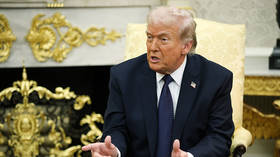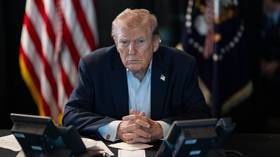Fighting against peace: Why US doesn’t want an end to wars
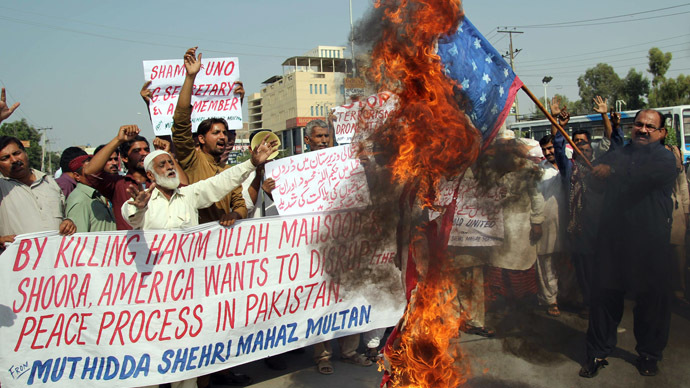
The only surprising thing about the news that the US is sabotaging peace moves in Afghanistan and Pakistan is that anyone should find the news surprising.
As reported on RT, Pakistan
has accused the US of sabotaging peace talks
between the authorities in Islamabad and the Taliban following
last Friday’s drone assassination of the Pakistani Taliban leader
Hakimullah Mehsud.
“The murder of Hakimullah is the murder of all efforts at peace," Pakistani Interior Minister Chaudhry Nisa said. "Brick by brick, in the last seven weeks, we tried to evolve a process by which we could bring peace to Pakistan and what have you [the US] done?"
The killing of Hakimullah Mehsud comes less than a month after the US effectively wrecked the Afghan government’s efforts to engage with the Taliban by capturing Latif Mehsud, Hakimullah’s lieutenant. Latif Mehsud was the man that the Afghan government hoped would be a go-between for peace talks with the Taliban. Afghan President Hamid Karzai was reported to have been furious about the US operation. Karzai has also said that the drone strike against Hakimullah Mehsud “took place at an unsuitable time.”
The fact is that on several important occasions in the last 30
years or so, the US has wrecked peace efforts and used its power
to provoke or prolong conflicts which could have been avoided or
solved without further bloodshed.
1. Iraq 1990-1991
From August 1990 to January 1991, there were plenty of chances to achieve a diplomatic solution in relation to Iraq’s invasion of Kuwait and which would have resulted in an Iraqi withdrawal, but Washington was determined to go to war. When the war started, they rejected diplomatic moves, such as the plan put forward by the Soviet leader Mikhail Gorbachev, to end the conflict before ground troops were deployed in Kuwait.
Saddam Hussein’s forces could have been removed from Kuwait without a war in which many thousands were killed, but Washington didn’t want it.
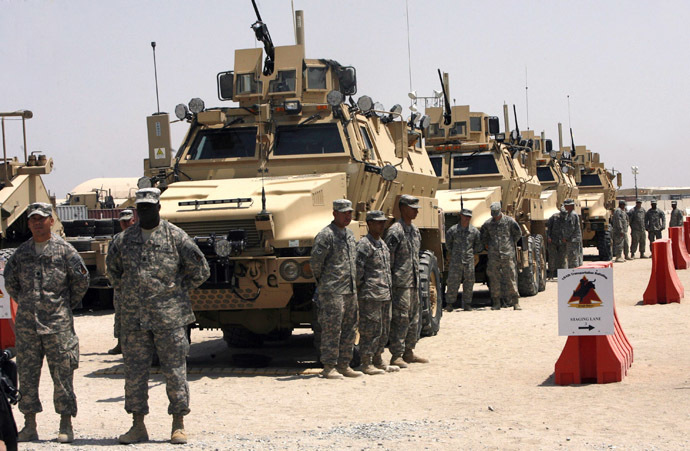
2. Kosovo
That was at the start of the ’90s. Now let‘s fast forward to the end of that decade. In order to complete the destruction of Federal Yugoslavia, Washington aggressively championed the cause of a hardcore terrorist group, the Kosovo Liberation Army, in the late 1990s. The US marginalized Kosovar leaders who wanted to pursue a peaceful path towards independence, such as the politician Ibrahim Rugova, who urged passive resistance. Instead they pushed for a violent solution to the problem of Kosovo’s status: their strategy being to provoke a retaliation from the government in Belgrade, which would then provide the pretext for the NATO bombing of Yugoslavia.
The Rambouillet Conference of March 1999 was ostensibly about trying to broker a peace deal between the Kosovar Albanian delegates and the Yugoslav authorities. But the terms were deliberately made so onerous - Appendix B allowed NATO forces freedom of movement throughout the whole of Yugoslavia - so as to guarantee its rejection by Belgrade.
“I think certain people were spoiling for a fight in NATO at that time,” revealed Lord Gilbert, a UK minister of state for defense procurement, in 2000. “If you ask my personal view, I think the terms put to Milosevic at Rambouillet were absolutely intolerable. How could he possibly accept them? It was quite deliberate.”
Even Henry Kissinger, the former US secretary of state and a man who can hardly be labeled a ‘peacenik‘, admitted: “The Rambouillet text, which called on Serbia to admit NATO troops throughout Yugoslavia, was a provocation, an excuse to start bombing.”
Again, Washington had sabotaged a peaceful solution to a dispute and war ensued, with all its horrors.
3. Iraq 2002-2003
In 2002/3 we had the contrived WMD ’crisis’ with Iraq.
If Washington had genuinely been concerned about the possibility of Iraq being in possession of WMDs, they would simply have waited for Hans Blix and his team of UN weapons inspectors to finish their job. However, as we all know, the WMDs issue was merely a pretext for war, with the US knowing full well that the country was disarmed. The Iraqis were desperate to avert an attack on their country, but diplomatic offers from Baghdad in the lead-up to the illegal invasion were dismissed.
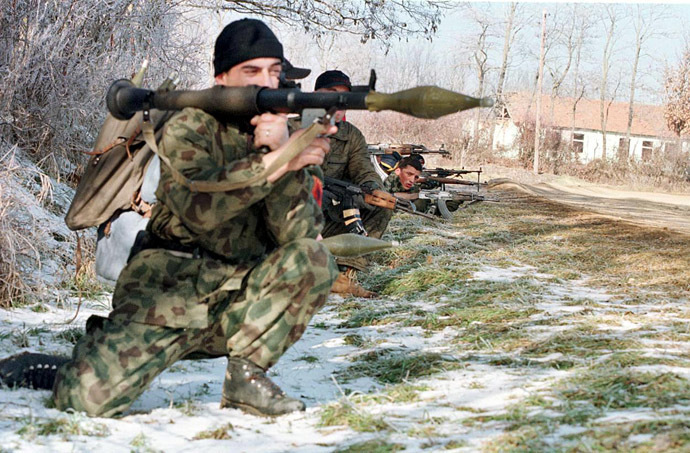
The result of the US opting for war and not peace in Iraq has
been the deaths of at least 500,000 people since 2003.
4. Libya
In 2011, a UN resolution ostensibly about protecting civilians
was used by the US and its NATO allies as a pretext for forcibly
removing from power the government of Libya. During this
‘humanitarian’ intervention, which led to a sharp spike in the
death toll, Washington and its allies frequently rejected calls
for a ceasefire and a diplomatic solution. Today, Libya is - like
Iraq - a wrecked country. But it all could have been very
different, if Washington, instead of opting for war, had worked
to bring warring factions to the negotiating table.
5. Syria
In Syria too, the US has set out since 2011 to prevent a peaceful solution to the country’s internal divisions. While an outright NATO attack on Syria has, at least for the time being, been avoided, it's been public opinion in Western countries and adroit Russian diplomacy which has prevented World War III from breaking out in the Middle East this year, rather than America’s leaders suddenly turning over a new leaf.
If the US genuinely wanted an end to the terrible bloodshed in Syria they’d be encouraging the so-called ‘rebels’ to halt their campaign of violence and sign up to the political process and contest elections.
The Baathists have made significant reforms in Syria in the past
two years, not least ending the party’s near five-decade long
political monopoly, but Washington hasn’t been interested in
peaceful democratic change, only in the violent overthrow of
President Assad and his replacement by someone who will do its
bidding. The result of this policy has been catastrophic for the
people of Syria who, like the people of Iraq and Libya, watch as
their country is destroyed before their very eyes.
While promoting itself as the great 'peacemaker', it's the sober
truth that no country has done more to stoke up conflicts and
sabotage peaceful solutions to them in recent years than
the US, with the killing of Hakimullah Mehsud being only
the latest example.
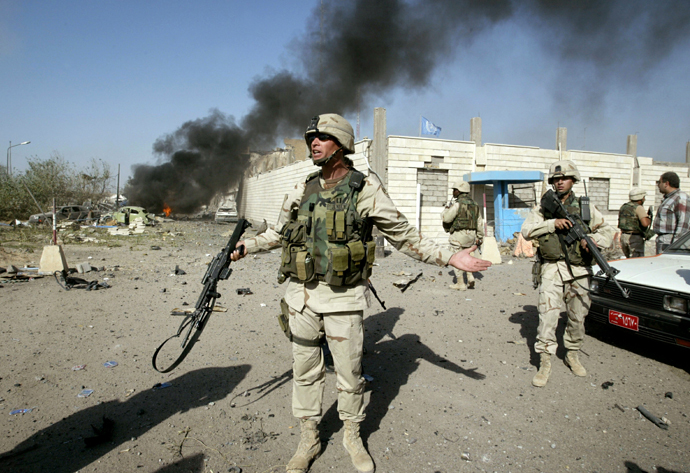
Why does the US act in this destructive way? It’s important to understand that the US government doesn’t act in the interests of the ordinary, decent Americans, who are sick and tired of war and military ‘interventions’, but in the interests of Wall Street and what President Eisenhower famously referred to as ‘the military-industrial complex’.
The very last thing that Wall Street and the military-industrial complex want is peace. They thrive on wars and conflicts. Wars and conflicts mean profits. Nice, big, juicy profits. As Charlie Chaplin‘s anti-hero Monsieur Verdoux put it, “Wars, conflicts - it’s all business.”
Last month a report by the Public Accountability Initiative revealed that many of the leading ‘commentators’ who went on US TV stations to call for military strikes against Syria had undisclosed ties to military contractors. The report “identifies 22 commentators who weighed in during the Syria debate in large media outlets, and who have current industry ties that may pose conflicts of interest. The commentators are linked to large defense and intelligence contractors like Raytheon, smaller defense and intelligence contractors like TASC, defense-focused investment firms like SCP Partners, and commercial diplomacy firms like the Cohen Group.”
Among the 'commentators' supporting strikes on Syria was Madeline Albright, the US secretary of state at the time of the phony ‘peace’ conference at Rambouillet in 1999.
Bombing Yugoslavia, bombing Syria. With the violent destruction
of Iraq and Libya along the way, to say nothing of the turmoil US
policies have brought to Afghanistan and Pakistan. John Lennon
implored us to ‘give peace a chance’, but until the US radically
changes its political system and power is returned to ordinary
people and away from those with a vested interest in endless war,
its stoking up of conflicts and sabotaging of peace initiatives
will only continue.
The statements, views and opinions expressed in this column are solely those of the author and do not necessarily represent those of RT.
The statements, views and opinions expressed in this column are solely those of the author and do not necessarily represent those of RT.



